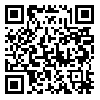Volume 9, Issue 3 (8-2021)
J Diabetes Nurs 2021, 9(3): 1648-1659 |
Back to browse issues page
Download citation:
BibTeX | RIS | EndNote | Medlars | ProCite | Reference Manager | RefWorks
Send citation to:



BibTeX | RIS | EndNote | Medlars | ProCite | Reference Manager | RefWorks
Send citation to:
Nequee F. Effectiveness of Stress Inoculation Training on Adherence to Treatment Based on Glycosylated Hemoglobin Index. J Diabetes Nurs 2021; 9 (3) :1648-1659
URL: http://jdn.zbmu.ac.ir/article-1-484-en.html
URL: http://jdn.zbmu.ac.ir/article-1-484-en.html
payamnoor univercity , f.nequee@yahoo.com
Abstract: (3582 Views)
Introduction: Complications and problems of diabetes can be controlled by following the treatment. This study aimed to evaluate the effectiveness of stress inoculation treatment on adherence to the treatment among type II diabetic patients with glycated hemoglobin index.
Materials and Methods: This quasi-experimental study was conducted based on a pretest-posttest control group design. The statistical population of the present study included patients with type 2 diabetes having a record in the Imam Khomeini Hospital, Mahallat, Iran, in 2009-2010. The samples (n=50) were selected by convenience sampling method and matched in experimental and control groups. The research instruments included a questionnaire of adherence to treatment and a glycated hemoglobin test for both groups. Stress inoculation training techniques were performed in ten 90-minute sessions for the experimental group. After the administration of treatment in both groups, the questionnaire and blood test were performed again to evaluate glycated hemoglobin. The collected data were analyzed using a one-way analysis of covariance.
Results: The results of the study showed that the mean scores of adherence to medication treatment (P=0.0001) and adherence to diet (P=0.0001) in the intervention group were increased, compared to the control group, which was statistically significant. Based on the results, a significant decrease was observed in the mean of glycosylated hemoglobin in the intervention group, compared to the control group (P=0.0001). However, the decrease in the mean of adherence to treatment in physical activity was not significant (P=0.062).
Conclusion: According to the findings of the present study, stress inoculation training can be used to control glycosylated hemoglobin.
Materials and Methods: This quasi-experimental study was conducted based on a pretest-posttest control group design. The statistical population of the present study included patients with type 2 diabetes having a record in the Imam Khomeini Hospital, Mahallat, Iran, in 2009-2010. The samples (n=50) were selected by convenience sampling method and matched in experimental and control groups. The research instruments included a questionnaire of adherence to treatment and a glycated hemoglobin test for both groups. Stress inoculation training techniques were performed in ten 90-minute sessions for the experimental group. After the administration of treatment in both groups, the questionnaire and blood test were performed again to evaluate glycated hemoglobin. The collected data were analyzed using a one-way analysis of covariance.
Results: The results of the study showed that the mean scores of adherence to medication treatment (P=0.0001) and adherence to diet (P=0.0001) in the intervention group were increased, compared to the control group, which was statistically significant. Based on the results, a significant decrease was observed in the mean of glycosylated hemoglobin in the intervention group, compared to the control group (P=0.0001). However, the decrease in the mean of adherence to treatment in physical activity was not significant (P=0.062).
Conclusion: According to the findings of the present study, stress inoculation training can be used to control glycosylated hemoglobin.
Type of Study: Research |
Subject:
Interventions for diabetes
Received: 2021/07/6 | Accepted: 2021/09/18 | Published: 2021/10/17
Received: 2021/07/6 | Accepted: 2021/09/18 | Published: 2021/10/17
Send email to the article author
| Rights and permissions | |
 |
This work is licensed under a Creative Commons Attribution-NonCommercial 4.0 International License. |




